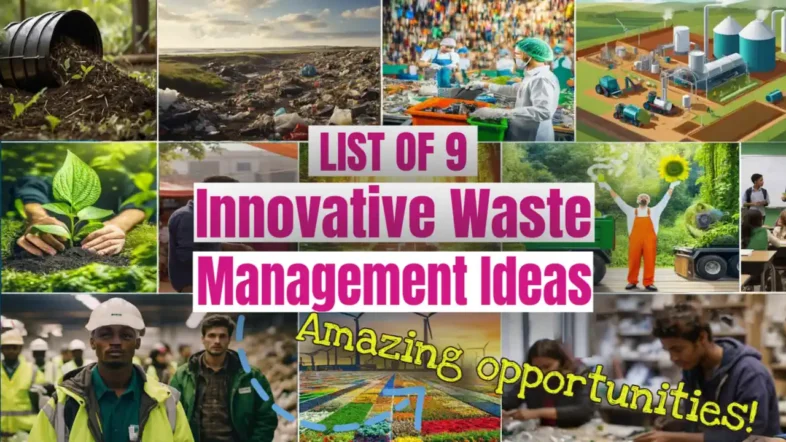We've listed our innovative waste management ideas to help entrepreneurial businesses launch their dream green businesses.
The world is drowning in waste. Landfills are overflowing, plastic pollutes our oceans, and traditional waste management methods are straining under the pressure. But amidst this growing crisis, a wave of innovation is surging. Entrepreneurs are developing creative solutions to tackle waste head-on, and with it, a wealth of opportunities are emerging for those passionate about building a more sustainable future.

From Trash to Treasure: Turning Waste into Valuable Resources
One of the most exciting areas of innovation in waste management focuses on transforming waste into valuable resources. Here are some ideas to spark your entrepreneurial spirit:
1. Organic Waste Composting Revolution
Food scraps and yard waste make up a significant portion of landfill content. Composting these materials transforms them into nutrient-rich fertilizers, perfect for gardens and agriculture. Here's where you can step in:
- Community Composting Services: Offer convenient curbside pickup or drop-off points for organic waste, then process it into high-quality compost for sale to local gardeners and landscapers.
- Indoor Composting Solutions: Develop user-friendly indoor composting bins or kits for urban dwellers who want to compost food scraps in their kitchens or apartments.
- Black Soldier Fly Larvae Composting: Explore the fascinating world of black soldier fly larvae, which can efficiently break down organic waste. You could breed and sell these larvae to composting facilities or develop your own black soldier fly composting operation.

2. Plastic Upcycling & Repurposing
Plastic pollution is a global threat. Enterprises tackling this challenge are finding innovative ways to give plastic a second life. Here are some possibilities:
- Upcycling Plastic Waste into New Products: Collect plastic waste and transform it into new, usable items like tote bags, furniture, or building materials. Creativity is key here!
- Chemical Recycling of Plastics: Develop or utilize existing technologies that break down plastic waste back into its base components, allowing it to be used to create new virgin plastic products.
- Plastic-to-Fuel Conversion: Explore advanced technologies that convert plastic waste into usable fuels, diverting it from landfills and potentially offsetting reliance on fossil fuels.

3. E-Waste & Appliance Recycling Redefined
Electronic waste (e-waste) is one of the fastest-growing waste streams. Entrepreneurial opportunities abound in this sector:
- Secure E-Waste Collection & Recycling: Offer secure and responsible e-waste collection services for businesses and individuals, ensuring proper dismantling and responsible recycling of electronic components.
- Refurbishing & Reselling Used Electronics: Develop a business model focused on refurbishing pre-owned electronics and reselling them at a competitive price, extending their lifespan and reducing e-waste.
- Urban Mining of E-Waste: Invest in technologies that extract valuable metals like gold, silver, and rare earth elements from e-waste, creating a sustainable source of these critical materials.
Tech-Powered Solutions for Smarter Waste Management
Technology is playing a crucial role in revolutionizing waste management. Here are some innovative ideas that leverage tech to optimize waste collection and processing:

4. Smart Waste Bins & Sensors
Imagine trash cans that compact waste, optimize collection routes, and even monitor fill levels. Smart bins equipped with sensors and connected to the internet are becoming a reality. Here's how you can get involved:
- Develop or distribute smart waste bin technology: Design or partner with existing companies to develop and distribute smart bins to municipalities and waste management companies.
- Data Analytics for Waste Management: Analyze the data collected by smart bins to optimize collection routes, predict waste generation, and improve overall waste management efficiency. Offer these data analysis services to waste management companies.

5. AI-Powered Waste Sorting & Recycling
Sorting different types of waste is a labour-intensive process. Artificial intelligence (AI) is bringing automation to the forefront. Here are some business opportunities:
- Develop AI-powered sorting robots: Create or partner with robotics companies to develop robots equipped with AI and computer vision to accurately sort different waste streams at recycling facilities.
- AI-powered waste identification apps: Design mobile apps that utilize AI image recognition to help consumers correctly identify and sort their waste for recycling.
6. The Sharing Economy Meets Waste Management: Peer-to-Peer Composting & Recycling Networks
The sharing economy is a great area to introduce innovative waste management ideas. It is just starting to grow in a way that opens up profitable areas that are disrupting traditional industries, and waste management is no exception. Here's how you can leverage this trend:
- Develop a platform connecting people with backyard compost bins: Create an app or website that connects individuals with excess food scraps to those with backyard compost bins who can accept the organic waste.
- Peer-to-peer bulky waste collection and hauling: Develop a platform that connects people with bulky waste to those with trucks or trailers who can transport the waste to disposal or recycling facilities for a fee.

Education & Awareness: Building a Greener Future Starts with You
Innovation goes beyond technology and clever business models. Educating consumers and businesses about responsible waste management practices is crucial for long-term success. Here are some impactful ways to get involved:
7. Interactive Waste Education Workshops & Programs
Develop engaging workshops or online programs that educate schools, communities, or businesses about waste reduction, recycling best practices, and composting techniques.

There's a gold rush happening, but it's not for gold this time – it's for knowledge.
Rising Demand
The demand for online training courses is exploding, with platforms like Udemy experiencing a surge in users hungry to develop new skills. Entrepreneurs with expertise in green practices are perfectly positioned to capitalize on this trend.
You can turn your green knowledge into a profitable online business by creating engaging online courses that teach others how to implement sustainable business practices, reduce waste, or navigate the world of green certifications.
Udemy is a great platform to consider for creating and selling your course. Signing up is simple – just head over to their website and click “Become an instructor.” Udemy offers a user-friendly course creation process, and they handle marketing and student enrollment, allowing you to focus on crafting high-quality content.
With a little planning and effort, you can transform your green expertise into a thriving online course and income stream, all while empowering others to join the sustainability movement.
8. Zero-Waste Consulting & Implementation Services
Introduction to Green Business Consulting
Green business opportunities have gained significant traction as companies seek to align with modern environmental standards and consumer expectations. By focusing on zero waste initiatives, businesses not only enhance their brand reputation but also contribute positively to the environment and can often realize cost savings.
As a consultant specializing in zero waste strategies, you will play a pivotal role in guiding businesses through the process of analyzing their existing waste management practices, identifying inefficiencies, and redesigning processes to eliminate waste at its source.
Waste Stream Analysis
The first step in this consulting process involves a thorough analysis of a company’s waste streams. This includes quantifying the types and volumes of waste produced and understanding the lifecycle of materials used in the business operations.
By employing advanced analytical tools and methodologies, such as material flow analysis (MFA) and life cycle assessment (LCA), consultants can provide insights into waste generation patterns and pinpoint areas where improvements can be made. This data-driven approach allows businesses to make informed decisions about reducing their environmental footprint while maintaining operational efficiency.
Strategy Development for Waste Reduction
After identifying the key areas of waste generation, the next phase focuses on developing customized strategies for waste reduction. This might involve redesigning products to use fewer materials, substituting single-use items with reusable alternatives, or improving supply chain logistics to minimize packaging waste.
Consultants can also help businesses implement new waste handling procedures, such as composting organic waste or setting up systems for recycling and reusing materials internally. By facilitating the adoption of circular economy principles, consultants ensure that resources are kept in use for as long as possible, extracting maximum value while minimizing environmental impact.
Implementation and Continuous Improvement
Finally, effective implementation of sustainable waste management practices requires ongoing monitoring and continuous improvement. Consultants can assist businesses in setting up monitoring systems that track the progress of waste reduction initiatives and identify new opportunities for further waste minimization.
Regular reporting and review help businesses stay committed to their zero waste goals and adapt to new challenges as they arise. In addition, consultants can provide training and support to employees at all levels of the organization, ensuring that sustainable practices are embedded in the company’s culture and operations. ng that sustainable practices are embedded in the company’s culture and operations.
Through these comprehensive services, zero waste consultants empower businesses to become leaders in sustainability, enhancing their competitiveness and contributing to global environmental conservation efforts.

9. Develop Eco-Friendly Products & Packaging Solutions
The last of our innovative waste management ideas is to design and sell reusable shopping bags, or compostable packaging materials, to help individuals and businesses reduce their reliance on single-use plastics and minimize waste generation.
Although there are now new depackaging machines that can recycle plastic, many members of the public simply want to go green and use compostable packaging anyway, to help individuals and businesses reduce their reliance on single-use plastics
Beyond Inspiration: Taking Action and Launching Your Green Dream
Feeling inspired by these innovative ideas? The world needs passionate entrepreneurs like you to tackle the waste crisis. Here are some key steps to get you started:
- Identify your niche: Carefully research the waste management landscape and identify a specific problem you're passionate about solving.
- Develop a business plan: Outline your concept, target market, marketing strategy, and financial projections.
- Seek funding and resources: Explore grants, loans, and incubator programs that support green businesses.
- Connect with mentors and advisors: Seek guidance from experienced entrepreneurs or industry professionals in waste management.
- Build your team: Assemble a team with the skills and expertise to bring your vision to life.
Innovative Waste Management Ideas – Summary
Don't let your green dream stay a dream! Turn it into a reality and become a leader in the sustainable waste management revolution.
Visit the International Patent and Trademark Society (https://www.inta.org/) website to learn more about protecting your intellectual property and take the first step towards making a positive impact on the planet.
FAQs: Frequently Asked Questions about Innovative Waste Management Ideas
What are the benefits of starting a business in innovative waste management?
The benefits are numerous! You'll be contributing to a greener future, have the potential for high growth in a booming sector, and enjoy the satisfaction of creating a positive social impact.
How much capital do I need to start a waste management business?
The capital required depends on your chosen niche. Some ideas, like education or consulting services, require less upfront investment, while others, like developing new technologies, may require significant funding.
Where can I find more resources and support for starting a green business?
Several resources can help you on your green business journey. Here are a few suggestions:
- The U.S. Environmental Protection Agency (EPA): The EPA offers a wealth of information on waste management, grants, and regulations. Check out their website at https://www.epa.gov/.
- The Small Business Administration (SBA): The SBA provides resources and guidance specifically for starting and running a small business. Visit their website at https://www.sba.gov/ for more information.
- Green Business Networks and Associations: Many local and national organizations support green businesses. These organizations offer networking opportunities, educational resources, and advocacy for sustainable practices. Find one relevant to your location or industry with a simple web search.







